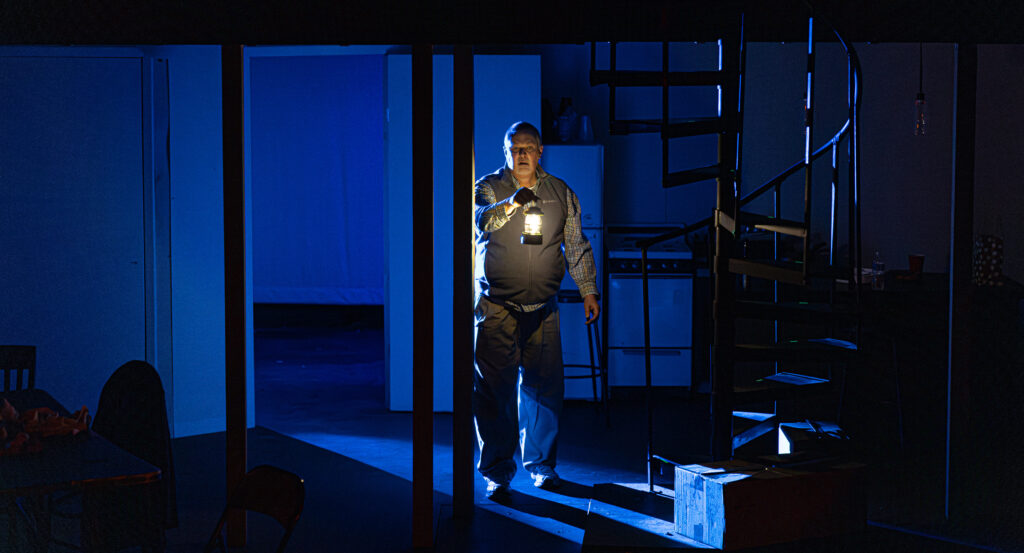
The biggest question I got asked regarding The Humans was, “What’s up with the ending?” Speculations ranged from “Erik had a heart attack and died” to “it was the aliens from the comic book.” And while I do think that the ending is open to interpretation, and I would never label any interpretation as “wrong,” (even the alien theory!) I wanted to provide some insight into my interpretation of the ending.
It starts with the circumstances that I had crafted: Erik is suffering from PTSD after having been at the World Trade Center on September 11, and thinking that his daughter, Aimee, had been killed. Add to that the fact that Erik and Deirdre (his wife for those who didn’t see the play) had been working all their lives at working-class jobs and making sacrifices so that they could eventually build a house on a lake and retire, with perhaps a cruise built into the budget each year. They were close to making that happen when there was a confluence of events that derailed their plan. First, their daughter, Brigid, was constantly hitting them up for money so that she could pursue her passion of becoming a composer. And while they didn’t cash-flow everything for her, a few hundred dollars here and there added up. The next big financial hit was that Erik’s mother, Momo, developed advanced dementia and needed additional care. Momo had also worked menial jobs all her life to make ends meet and had little in the way of savings. Erik’s brother, John, was unable to help so the task of taking care of Momo and helping fill in the gaps in coverage from Medicare and Medicaid started to add up. The thought of putting Momo into a care facility was discussed, but a) there was no money, and b) they wouldn’t do that except as a last resort. Add to this the everyday expenses of maintaining a house, buying groceries, keeping gas in the car, etc. (not to mention a small gambling habit) kept the dream of a comfortable retirement just out of reach.
The final straw was that Erik lost his job as head of maintenance and equipment at a Catholic high school because he had an affair with one of the teachers (in my circumstances, it was a male teacher, though this is not necessarily supported in the script). Because of the circumstances of the firing, Erik is now no longer eligible for his pension, which was the only thing that made retirement even a remote possibility. Now any thought that they had that they could achieve the American Dream of comfortable retirement was gone. Erik had torpedoed the dream and now must own up to the fallout.
What about the noises (and skip this portion if you are squeamish or easily triggered by 9/11): the thuds that occur several times throughout the play remind Erik of the sound of the bodies of the people who jumped out of the Twin Towers hitting the ground around him. To prepare for this, I watched parts of the documentary filmed on that day by Jules Naudet. There are scenes of the first responders in the lobby of one of the towers shortly after the first plane hit where you can hear a series of loud crashing thuds. These are the thuds Erik hears (I include this because it was part of the research I did, not as a means of sensationalizing this tragedy). The sound of footsteps running above are reminiscent of the people running to escape the disaster. The loud “trash compactor” sounds like the metal of the steel girders twisting and crashing to the ground, and the laundry room noise brings back memories of the rescue vehicles arriving.
The other important aspect of my prep was the “faceless woman,” who we learn is the nightmare version of the body of a dead woman who Erik mistook for his daughter, Aimee. When Erik is looking out the window, it is this woman that Erik sees walking around in the “alley” behind the apartment.
So, given these circumstances, the ending of the play (at least MY interpretation), is that Erik’s PTSD, fueled by all of the circumstances leading up to the ending, has caused everyday occurrences such as lights going out in an old building, the sounds of trash compactors and laundry carts, people moving around in apartments above, people rolling their carts to the laundry room, and dishes precariously stacked tumbling over, to take on the sounds and sights of the hell-scape of his nightmare. He is trying to take Richard’s advice to “go into the tunnel” but must first convince himself of the innocuous nature of the sights and sounds. If you’ve ever been alone in a quiet house late at night and worked yourself into a panic because everything appears to be sinister and you don’t know what’s hiding in the dark corners, or what is peering through the small part between the curtains covering a once-familiar picture window, you have some understanding of what Erik is going through. In the end, however, Erik is able to summon the courage to move into the basement from the apartment, and then rejoin his family upstairs to go home. I will let you assign whatever symbolism to that that you will.